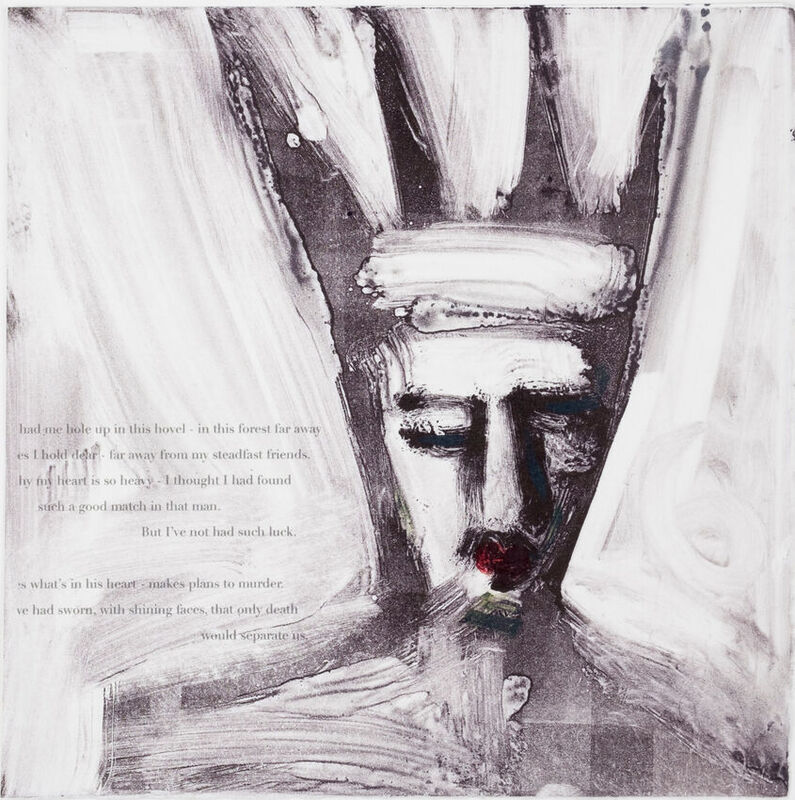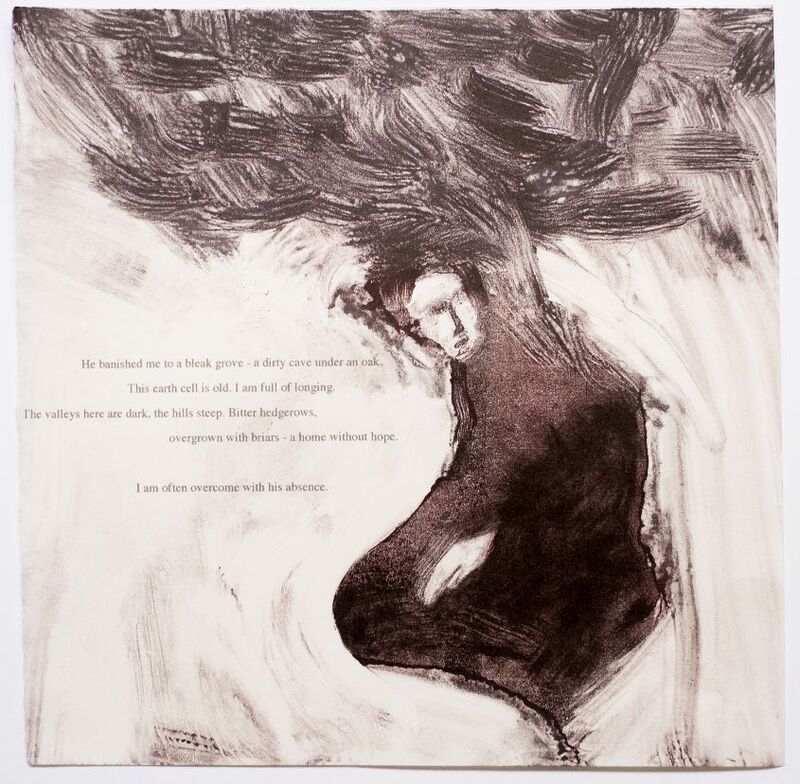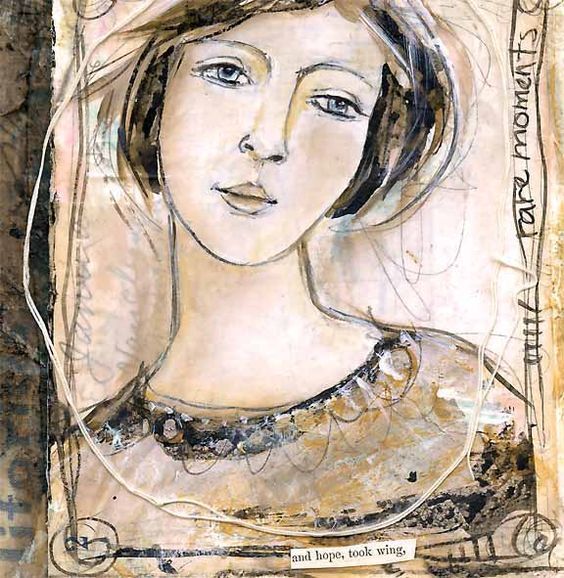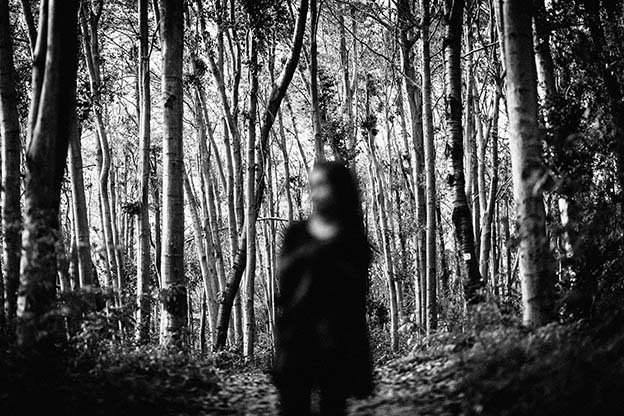The Liberating, New Found Voice in The Wife's Lament by Samantha Futino
The Liberating, Newfound Voice in The Wife’s Lament
Research by Samantha Futino
INTRODUCTION
Throughout the elegy entitled, The Wife’s Lament there are a variety of notions that allude to many conclusions regarding the role of a wife or a female during the Anglo-Saxon era in England. First, to assist in the understanding of the elegy, it is crucial to understand the term lament. According to the Oxford English Dictionary, the term is defined as “an act of lamenting, a passionate or demonstrative expression of grief” (OED 1). This given definition mirrors the actions of the wife amidst the elegy. Additionally, it is significant to observe the source of this writing, which is a woman. The Wife’s Lament directs readers towards the voice of a female speaker in a variety of ways. The title itself informs readers that they are receiving this information from a wife’s point of view; thus, reaffirming that these are words of an Anglo-Saxon female. Secondly, with her tone and chosen language, she continues to embody the qualities and practices of a female who lost their husband during this critical time in England. While it is important to examine the feminine speaker in this elegy, it is also essential for readers to ask the question of how her voice is significant and what her voice is signifying for all Anglo-Saxon women who lost their husbands during this time. In the Anglo-Saxon era of England, the words of women were not trusted or heard, unless there was a male figure by their side (Davidson, 2). Women were commonly recognized by being dominated by males, whether it be their husband, father, uncle, or brother (2). Within this poem, readers hear from a wife, whose husband has been exiled due to an unknown reason. The wife’s pain and sadness gush through her diction and tone, making the pain she is enduring exquisitely evident. For the duration of the poem, the wife’s female voice is the only one speaking, thus giving her a certain amount of agency. Throughout this written report, I will carefully examine The Wife’s Lament, and through my research, I will discover the power of the female voice engravened in this elegy. As the researcher, I am examining the importance of her voice, and what it is signifying for all women during this era within the same situation. I will do so by simultaneously examining the obstacles, qualities, and lifestyles of Anglo-Saxon women during this era. The power of the female voice in "the Wife’s Lament” blurs the boundaries of what was expected of Anglo-Saxon women. The demonstration of a female speaker, expressing her losses and struggles while dealing with a concept of male domination, is a power move for her, since women’s voices were rarely heard or trusted without a male figure being present.
OBJECTIVES
My research regarding the elegy entitled The Wife’s Lament, aims to draw attention to the power and efficiency of the speaker’s female voice and agency. Anglo-Saxon women in this era lacked independence because they were constantly being dominated by the men in their lives. Due to the treatment that many of the women endured during this time, I have deemed it essential, to learn more about the role of women in this time period. There are a variety of different approaches that I considered while choosing the elegy, The Wife’s Lament. I considered where I stand as a student of English Language and Literature, where I stand as a woman, whom I choose to stand with and for, and lastly what I am inclined to know more about. As a student of English, I believe that history from the Middle Ages and the study of literature work together, thus resulting in many of the greatest pieces in literary history known in our lifetimes. Studying texts from the Middle Ages heightens my understanding of leading literature which assists in the building blocks of my education. Studying a text from the Middle Ages aids in the understanding of history, a different form of language, and most importantly a different lifestyle. Secondly, as a woman who is constantly interested in the rights and restrictions of females in the past or current times, I felt inclined to research such an important time in our history. I believe women owe it to ourselves to stand with other women and be aware of the struggles that each of us have faced and are still facing. Through the research of The Wife’s Lament, her persona allows her to speak out as a female, regardless of who believed her, thus proving her strength as a speaker. Lastly, as a student, it is important to evaluate your knowledge and become aware of what you know, and what you are seeking to know more of. Topics like so are valuable to my education and assist in the growth of my intellect. My intent is for my research to differ from past research that has already been done. I aim to do so through my approach as a student, in hopes to bring a different perspective into such an exhilarating topic. Overall, I intend for my piece to examine how the wife in this elegy, blurred the boundaries for women during the time, by speaking out, regardless if her words were valued or not. Against all odds, the wife in The Wife’s Lament used her female agency, to voice her sorrow, where other women lived in silence.
METHODS AND OBSERVATIONS
WHEN, WHERE, AND HOW?
My main source of textual evidence is derived directly from the textbook entitled The Anglo-Saxon World An Anthology by Oxford World’s Classics, focusing on the elegies and The Wife’s Lament. Secondly, I have taken the opportunity to use online databases to assist me in my findings. Through the assistance of search engines such as Brock Universities, Omni Database and Google Scholar, I have been privileged to find articles that support my research. Throughout this academic poster project, I will discuss a variety of scholarly sources, and each of them assisted my research to investigate how women speaking publicly, their voices, and oral communication was treated by others in the Anglo-Saxon era of England. Through those findings, I will then further examine how the wife’s voice in The Wife’s Lament, can be viewed as a turning point of liberation for women because she proceeded to speak out about her pain under the conflict of male dominance.
THE TEXT:
First, I would like to draw attention to stanza 1, lines 1-5, the wife is explaining how she is feeling: “I draw these words from my deep sadness, /My sorrowful lot” (Crossley-Holland, 1-2). She positions herself in the elegy. as a sorrowful woman. The wife admits that her husband has been exiled (5) which is the reason why she is in her current sad state of mind. Through my intricate understanding of her words, it becomes clear that she set out to find her husband, “…to search for my man” (10) though she realizes that they will remain separated because someone concealed information from her, “But that man’s kinsmen laid secret plans/to part us, so that we should live/most wretchedly far from each other…” (11-13). To live wretchedly, is to “live in a miserable or unhappy fashion; with great misery, discomfort, distress, or unhappiness; miserably” (OED,1). The wife embodies this definition entirely through her admittance of sorrows, thus displaying the effect that the exclusion of her husband has had on her. As her elegy continues, her admittance of sorrows only grows more prominent. Throughout the end of stanza 3, and in the beginning of stanza 4 she states that she was sentenced to go “under an oak tree in the earth cave” (27) which shows how excluded and isolated women felt at the loss of a male figure. As the poem begins to dwindle, she makes many statements that reaffirm her grieving process, which simultaneously reinstates the male dominance that men held against their women. Statements such as “I am choked with longings” (28), “I mourn in my miseries” (32) and “Grief goes side by side with those/who suffer longing for a loved one” (52-53) reaffirms the wife’s pain. Her husband’s disappearance and immense amount of male domination assisted her in finding her voice. Next, the scholarly articles for my report will examine the power of an Anglo-Saxon female’s voice and reaffirm how the wife’s voice in my chosen elegy was a liberating move for a woman to make.
SOURCE 1:
The scholarly article entitled, Women & Language: Essays on Gendered Communication Across Media, published by Eastern Illinois University and edited by Melissa Ames and Sarah Himsel Burcon, speaks upon the gendered discrepancies within the literature, what was viewed as valuable versus what was not, what was viewed as believable versus what was not, and most importantly, the struggles that women had to go through if they decided to speak their voice. In relation to the elegy, it was a critical turning point for the wife to speak out about her pain and sorrow since women’s writings and voice were rarely seen as important. Ames and Burcon reaffirm this notion, “The conflation of women with oral culture and, therefore, with the lower portion of the binary, has been scrutinized by scholars in recent years”; this historical tendency, as traced and analyzed by Ames and Burcon, demonstrates negative connotations surrounding the merging of examples of women with orality” (2-3). The article admittedly compares male speaking to female speaking during this era and reinstates that they were both viewed with a different mentality. This is seen when Ames and Burcon state, “a great deal to do with assertations of power…Defining the female sentence as lacking rationality, coherence, assertiveness and so on is an attempt to set up a particular subject position for females in the real world” (5). This statement reaffirms the negative connotations that the wife risked facing when she decided to use her voice and share her words. The wife risked the chance of failure and being viewed as incompetent and irrelevant. Yet despite all odds, she used her voice as a powerful assertion for women and asserted awareness for women, who lost their husband and who lacked independence, during this time. The article states the unfairness that women’s writing received and seamlessly reaffirms how dynamic it was for the wife to ignore the social norms of women’s writing and still, write. The authors assert: “women’s writing has been devalued because it suggests universality between all women, and therefore, all women writings” (7). This statement is firmly stating that women’s writings were not regarded with respect and were “devalued” (7).
SOURCE 2:
Ashby Kinch, author of The Ethical Agency of the Female Lyric Voice: The Wife’s Lament and Catullus 64 directly outlines the wife’s agency and power, while reaffirming the struggles of women during this era. Kinch states “The Wife’s Lament modifies the ‘horizons of expectation’ for its original audience by adopting a new set of literary values available in a formally and conceptually related genre” (Kinch 126). To expand on “modifying the horizons of expectations” (126), the statement is referring to the ways in which others would normally view a text written by a female about mourning and sorrows. Though, The Wife’s Lament changes the attitudes of the readers by switching the perspective of it and defining it as a liberating moment for a woman during this time. The text goes on to reaffirm this notion as it states, “The Wife’s Lament, by giving full voice to the woman within the language of male warrior culture, radically re-reads the Anglo-Saxon tradition…” (126). Kinch affirms the notion of a male-dominated culture (as we read in poems like Beowulf) and reinforces just how difficult it was for the words of women to be valued in this society. The quote gives the female speaker’s words full attention, thus empowering her once more. Through the analysis of these two distinct quotations taken from the scholarly article listed above, it becomes evident that the female speaker of The Wife’s Lament has embodied an abundance of influential and powerful characteristics for a women during this time. The wife went against social normalizations and spoke out, regardless of the outcome.
SOURCE 3:
Lastly, I would like to introduce an article entitled, Erotic ‘Women’s Songs’ in Anglo-Saxon England written by Clifford Davidson. I am using this article to draw attention to the ways in which women in this era lacked independence. The article further explains this concept, “…The place of a woman was under the control of a man, first a father or maternal uncle, then later a husband – to whom she is to retain her loyalty in the prescribed ways” (Davidson, 454). Davidson’s statement reinstates the ways in which a woman had never independent self. Though the wife is mourning in her elegy, this could be her first step into a life of independence. The wife knew the restriction of women in her era, but instead of staying silent and obeying the society that she was groomed into, she spoke out.
IMPLICATIONS OF RESEARCH
Once critically examining the elegy itself, The Wife’s Lament and the three found scholarly sources, it is essential to ask the question of so what? Throughout my research, I have concluded that the wife in this elegy had begun to pave a way for all Anglo-Saxon women in that era by not conforming to societies binaries and staying silent, but instead speaking out about her struggles. It is through the toxic use of male domination that the wife found her voice, in hopes to help other women do the same in this era. I believe my research critically explains the struggles that women had to go through and touches upon a variety of issues with the gendering of males and females. My research also intricately explains the ways in which women were viewed, giving readers a chance to compare stereotypes of women at that moment in history and its culture to stereotypes of women now in hopes that we have grown. I hope for this research to continue, for liberating women of the past to be noticed and praised because speaking out during a time when you were meant to be silent was not easy.
CONCLUSION & RECOMMENDATIONS
The most beneficial way to further this research is to continue examining female voices in the Anglo-Saxon era. It would also be interesting to provide a comparison between The Wife’s Lament elegy and The Husband’s Message elegy; there may be some unanswered questions about gender restrictions during this era within those poems. Next, it would be beneficial too make a timeline of these poems and see what changed throughout the years regarding the women’s tone, language choice, and feelings towards certain issues happening around them during this era. In conclusion, the female speaker in The Wife’s Lament, positioned herself in a powerful role when she chose to speak upon the struggle that she endured, and this notion can be investigated in other Anglo-Saxon elegies and poems with female voices.
REFERENCES & ACKNOWLEDGEMENTS
Crossley-Holland, Kevin. The Anglo-Saxon World: An Anthology. Oxford Universities Press, 2009.
Ames, Melissa and Sarah Himsel Burcon. Women and Languages Essays on Gendered Communiations across Media. McFarland, 2011
Kinch, Ashby. "The Ethical Agency of the Female Lyric Voice: The Wife's Lament and Catullus." Studies in Philology, vol. 103, no. 2 Spring 2006, pp. 121-152.
Davidson, Clifford. "Erotic 'Women Songs' in Anglo-Saxon England." Neophilologus, vol. 59, no. 3, 1975, pp. 451.
Images
Dorsey, Romayne Rubinas. "The Wife Lamenr." News - Indiana Publlis Media, The Wife's Lament (indianapublicmedia.org)
Eaton, Morag, "The Wife's Lament from the Book of Exeter: Blood on Lips." Foldyard Gallery, 'The Wife's Lament' from the Book of Exeter: Foldyard
Eaton, Morag, "The Wife's Lament from the Book of Exeter: ....A Home Without Hope." Foldyard Gallery, 'The Wife's Lament' from the Book of Exeter: Foldyard
Pettitt, DJ. "rare memories" dj pettitt's Profile | Typepad; dj pettitt artist
How to cite this research:
Futino, Samantha. "The Liberating, Newfound Voice in The Wife’s Lament." In Reading the Middle Ages, supvr. Teresa Russo, (issue 1: Old English Literature from Manuscript to Verse: Battles, Heroes, and Women), Centre for Medieval and Renaissance Studies (MARS), Brock University, March 2020, Niagara (The Liberating, New Found Voice in The Wife's Lament · Reading the Middle Ages: Oral and Literate Cultures · Brock University Library). Digital Scholarship Lab (DSL), Tim Ribaric and Daniel Brett.



